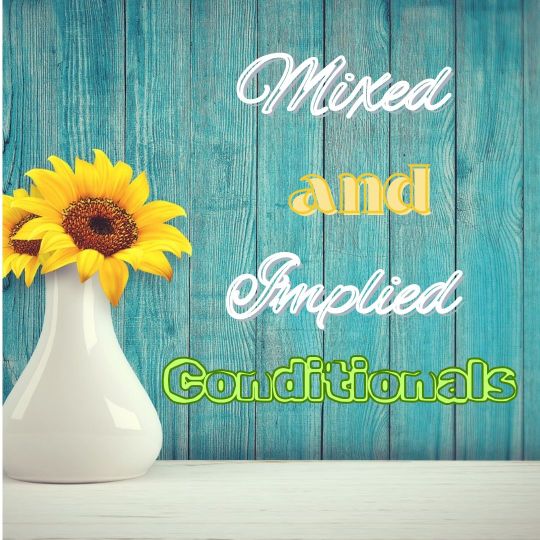#pastcondition
Text
Conditional sentences: Mixed and Implied

Mixed and Implied Conditionals
Mixed Conditionals:
Mixed conditionals are a combination of elements from both the second and third conditionals.
These types of conditional sentences involve a present or future unreal condition and a past unreal result, or vice versa.
Mixed conditionals are useful for expressing complex relationships between past, present, and future situations.
Here are examples and explanations for two common types of mixed conditionals:
Present unreal condition with past unreal result: If I knew (past indefinite) you were coming, I would have baked (would + present perfect) a cake.
Past Unreal Condition with Present Unreal Result: If she had studied harder (past perfect), she would have a better job now (would + base form).
Time Shift:
In mixed conditionals, there is a temporal shift between the condition and the result.
The condition may be related to the present or future, while the result is related to the past.
Implied Conditionals:
In an implied conditional scenario, where the result is understood without being explicitly stated, the conditional clause is often implied rather than explicitly mentioned.
I didn't know you were in town.
I should have picked you up from the airport.
Implied Conditional:
If I had known you were in town, I would have picked you up from the airport.
He never invited me to the party.
I would have attended.
Implied Conditional:
If he had invited me to the party, I would have attended.
Why didn't you inform me earlier?
I would have rearranged my schedule.
Implied Conditional:
If you had informed me earlier, I would have rearranged my schedule.
In these examples, the speaker expresses a regret or a missed opportunity, and the implied conditional clause provides the context for the unfulfilled condition.
Conditional sentences: Mixed and Implied
Would and Should in Conditional sentences
IF (Conditional) Sentences
Subordinate Clauses
Exclamatory Sentences
Imperative Sentences
Preposition – “Towards”
Read the full article
#combinationof#conditional#explicitlymentioned#futurecondition#futureresult#implied#mixed#pastcondition#pastresult#secondandthird#timeshift
0 notes
Photo

379 notes
·
View notes
Text
Confectionery Daddy Lyrics (Hellified)
Confectionery Daddy Lyrics (Hellified)
Conditional love never really lasts too long
It never really lasts too long
Ya
Disloyalty, inconsistencyA thing of the pastCause Conditional love never really last
I can eraseAll That bad tasteOut ya kisserYou fuck with meYou won’t miss her
Disloyalty, inconsistencyA thing of the pastConditional love never really last
There’s so much to reconsiderWith all this vigor and strengthThe bigger…

View On WordPress
#artist#black art#canadian artist#emerging artist#gifted musician#house music#latest in music#lyrical#lyrical beast#lyrics#music blogger#music discovery#poet#poetry#poetrycommunity#songwriter#songwriting
0 notes
Text
Might and Could in Conditional Sentences

Might & Could
Might and could are modal verbs often used in conditional sentences to express possibilities, uncertainties, or hypothetical situations.
Might:
Might is used to express a possibility or a less certain condition.
It suggests that there is a chance of the event happening but doesn't imply certainty.
If + subject + might + base form of the verb
Example: If it rains, we might stay indoors.
Could:
Could is used to express a general possibility, ability, or permission.
It is less tentative than might and can also be used to express a hypothetical or unreal condition.
If + subject + could + base form of the verb
Examples: If you study harder, you could improve your grades.
If he had more time, he could help with the project.
Past Unreal Conditions:
Both might have and could have can be used in past unreal conditions to express unrealized possibilities or opportunities.
Example: If I had known, I might have attended the meeting.
Mixed Conditionals:
Might and could can be used in mixed conditionals to express combinations of past and present conditions and their hypothetical results.
Example: If you had called me earlier (past unreal), I might be there with you now (present result).
Might and could are versatile modal verbs used in conditional sentences to convey possibilities, uncertainties, and hypothetical situations.
The choice between them depends on the level of certainty or probability you want to convey in the given context.
Might and Could in Conditional Sentences
Types of Conditional Sentences
Direct (Quoted) and Indirect (Reported) Speech
Negative Declarative Sentences: Structure, Usage, and Style
Prepositions “With” and “By” to compare
Read the full article
#ability#conditionalsentences#could#hypothetical#might#pastconditions#permission#possibility#present#uncertainties#unrealsituation#unrealizedpossibilities
0 notes